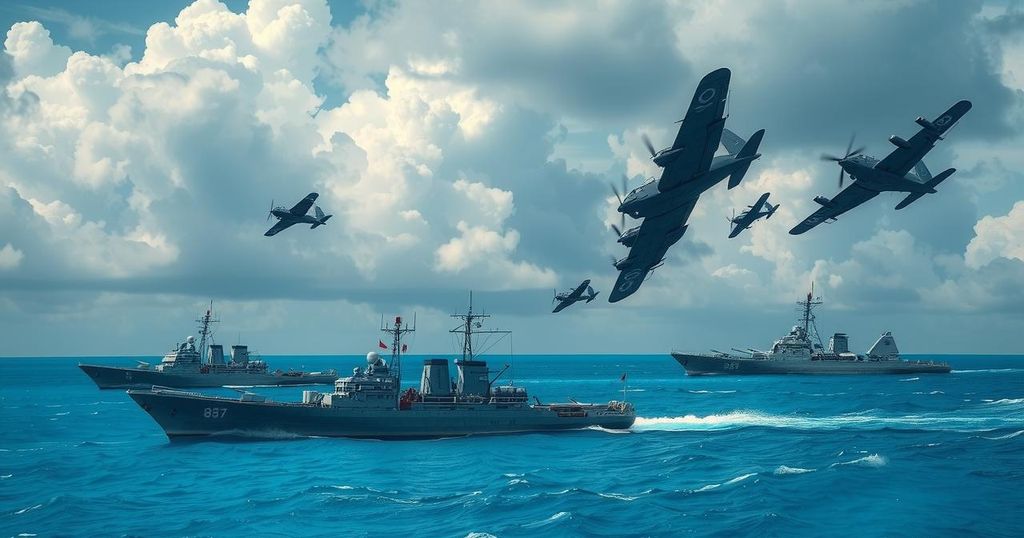Politics
AFRICA, ASIA, BEIJING, BRP SIERRA MADRE, CHAD, CHINA, DEFENCE MINISTRY, DEFENSE, EAST CHINA SEA, EASTERN THEATER COMMAND, FOREIGN MINISTRY, LAI, LAI CHING - TE, MARITIME SECURITY, MEXICO, MILITARY, NORTH AMERICA, SHANDONG, SHI YI, TAIPEI, TAIWAN, TAIWAN STRAIT, TERRITORIAL DISPUTES, UNITED STATES, US STATE DEPARTMENT, US-CHINA RELATIONS, WASHINGTON
Dante Raeburn
China Conducts Military Drills Targeting Taiwan Amidst Growing Tensions
China’s military executed live-fire drills targeting Taiwanese ports and energy sites, provoking criticism from the US for intimidation tactics. The exercises are part of heightened tensions in the Taiwan Strait, coinciding with remarks from Taiwan’s President criticising Beijing. The situation escalates geopolitical tensions, particularly regarding US support for Taiwan.
China’s military conducted “live-fire” drills targeting key ports and energy sites on Wednesday as part of an operation aimed at Taiwan, which Beijing claims as its territory. These exercises, labeled “Strait Thunder-2025A”, took place in the Taiwan Strait and East China Sea, areas critical for international shipping. Washington characterized the drills as “intimidation tactics” following remarks from Taiwan’s President Lai Ching-te labeling China a “foreign hostile force”.
During the military exercises, the Chinese forces practiced long-range engagement on simulated targets representing strategic ports and energy infrastructure. Senior Colonel Shi Yi of the Chinese military stated these drills were intended to “test the troops’ capabilities” in aspects like blockade and precision strikes. The ongoing maneuvers included the Shandong aircraft carrier, which was also simulating a blockade scenario around Taiwan.
Taiwan firmly condemned these exercises. Beijing’s foreign ministry issued a stark warning that punitive measures against Taiwan’s leadership would persist until they renounce their perceived push for independence. With a population of 23 million, Taiwan remains a flashpoint in US-China relations, particularly as Taiwan is a key security ally of the United States.
The US State Department criticized China’s military posturing, stating that its aggressive actions only serve to increase tensions and endanger regional stability and global prosperity. Additionally, Chinese leaders voiced their objections to US support for Taiwan’s government, especially regarding President Lai, whom they deem a “separatist”.
The current drills followed a comprehensive military exercise by China that included its army, navy, air, and rocket forces encircling Taiwan. In response, Taipei initiated its “Rapid Response Exercise” involving its own air and maritime forces. Taiwanese defense officials reported a significant array of Chinese military assets detected in the vicinity of the island.
Chinese propaganda efforts following the exercises featured imagery of their forces launching strikes on Taiwan. Meng Xiangqing from the PLA National Defence University cautioned that Taiwan’s lack of energy autonomy makes it susceptible to supply disruptions, which he argued would ultimately harm the inhabitants of the island.
Beijing has intensified its military operations around Taiwan in recent years, which many interpret as rehearsal tactics for a potential blockade. The situation has grown more tense since President Lai’s inauguration in May 2024, as he adopted a firmer stance on sovereignty issues compared to his predecessor. Although Taiwan operates independently, only a few nations officially acknowledge its statehood.
In response to increased Chinese aggression, US Defense Secretary Pete Hegseth recently emphasized the importance of a “robust, ready, and credible deterrence” in the Taiwan Strait. Analysts suggest that China’s extensive exercises are testing the limits of US support for Taiwan under the current administration, and there is concern about the US commitment in light of President Trump’s unpredictable foreign policies. Meanwhile, the long-standing rhetoric that Taiwan is part of China’s territory remains a contentious point, despite Taiwan’s historical governance by a variety of foreign powers.
The recent military drills conducted by China, targeting key infrastructure in Taiwan, have heightened tensions between Beijing and Taipei, as well as within the broader international community. Taiwan’s response reflects its commitment to sovereignty, while the United States continues to advocate for regional stability amid concerns regarding its own support for Taiwan. The situation remains intricate, with historical claims and strategic postures adding layers of complexity to cross-strait relations.
Original Source: www.kpvi.com








Post Comment